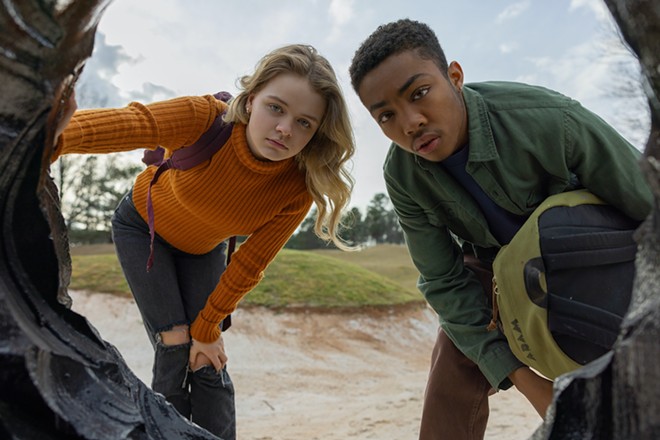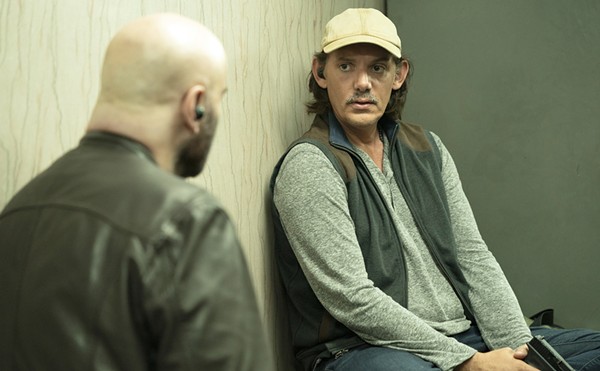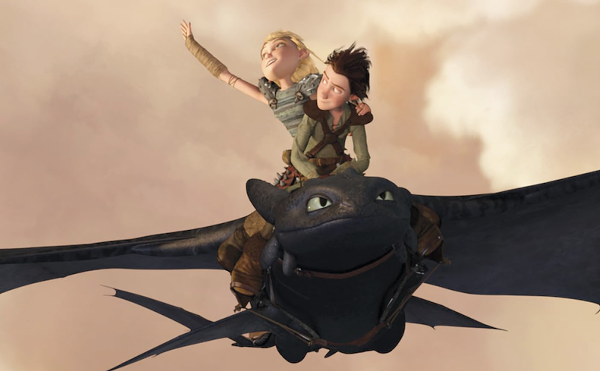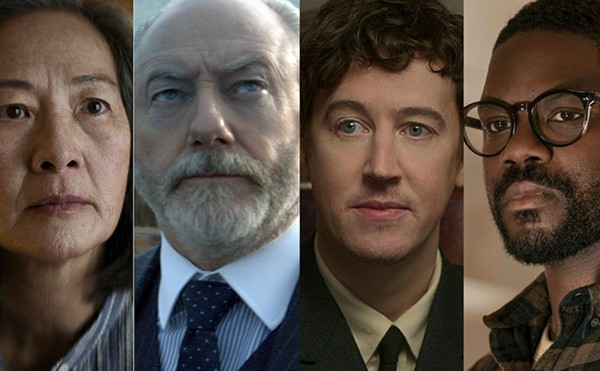
A black-comic story of an alien invasion — or, more exactly, an alien insinuation — Landscape with Invisible Hand can’t be faulted for a lack of ambition. Through its science-fictional funhouse mirror, the film manages to reflect a number of urgent contemporary issues — primarily income inequality, but also the deformation of our behavior by both traditional and social media, the seductively dangerous lure of technology and the falsity of the market’s “invisible hand” ensuring that the common good somehow results from the pursuit of self-interest. And along the way, Landscape both earnestly extols the power of art to inspire and sustain, and satirically explores white privilege, downsizing, litigiousness and censorship. Unfortunately, despite undeniable moments of humor and insight, Landscape never quite fully comes together, its many individually admirable parts failing to assemble into a coherent whole.
Directed by Cory Finley (Thoroughbreds, Bad Education), whose screenplay adapts a short novel by well-regarded YA author M.T. Anderson, Landscape With Invisible Hand envisions a near-future in which an alien race, the Vuvv, has essentially engineered a corporate takeover of the Earth. Rather than conquering the planet with force, the Vuvv simply dangle a glittering hook baited with advanced tech before our business overlords, and they (and thus we) become ensnared, willingly giving up control to gain access to the aliens’ seemingly wondrous and benign innovations. As usual, only a privileged few benefit from this exchange — they live in splendid isolation in floating cities that hover imperiously above the increasingly blighted world below — but most find themselves consigned to a hardscrabble existence, their jobs largely made obsolete by Vuvv technology.
The film efficiently delivers this backstory through a Vuvv-produced propagandistic lesson at the high school of 17-year-old Adam Campbell (Asante Blackk), whose family illustrates humankind’s diminished state: Newly single mom Beth (Tiffany Haddish), a former attorney now futilely searching for any sort of menial job, attempts to care for Adam and his younger sister (Brooklynn MacKinzie) by fending off creditors and retaining their home after her similarly unemployed husband (William Jackson Harper) departs in search of elusive opportunities elsewhere. Beth’s problems only compound when Adam impulsively offers their basement as a temporary shelter for the unhoused — and somewhat churlish — family of lovely new classmate Chloe Marsh (Kylie Rogers), in whom he has more than an altruistic interest.
Serendipitously, the blossoming attraction between Adam and Chloe offers a potential financial lifeline to both families: The Vuvv, who have no romantic inclinations of their own — they reproduce asexually — find humans’ courtship rituals a source of fascination and willingly pay for access to the mysteries of love. When Chloe suggests that they monetize the relationship by livestreaming their interactions to the Vuvv, Adam reluctantly agrees. Their “show” proves a cash-generating hit, but Adam eventually comes to resent the performative requirements. As this fracture begins to split the teens, it becomes evident that Chloe’s feelings are at least partially feigned, and the alien audience proves resentful of the deceit. An aggrieved Vuvv viewer sues for a refund on behalf of her brood, who had become strongly invested in the couple, and Beth is forced to negotiate a bizarre settlement: One of the plaintiff’s offspring, curious about human marriage, takes up residence with the Campbells and assumes the role of Beth’s husband.
Landscape’s highly unpredictable plot continues to take hairpin turns — including the Vuvv’s besotted embrace of a mural by Adam, a talented but still raw young artist whom the aesthetically impaired aliens deem a visionary genius — before a conclusion that offers a modest, guardedly hopeful testament to human resilience (and resistance).
Given the film’s level of invention, serious thematic aspirations and winning performances, especially by young leads Blackk and Rogers, there’s much to recommend in Landscape, but blind spots in its dystopian vision require viewers to overlook far too many logical inconsistencies. The fundamental premise of the film — Earth’s easy acquiescence to the Vuvv because of our desire for its seductive tech — entirely ignores the world’s complex geopolitics. The corporations that exert a controlling influence on the U.S. and other Western capitalist countries could perhaps be gulled by the Vuvv’s promises, but would authoritarian regimes in such places as Russia, China or Iran — much less North Korea — so willingly cede their power? Of course, Landscape is more a fable than an exercise in detailed world-building — it’s more George Saunders than George R.R. Martin — but such nagging questions, both large and small, keep eroding our belief in the film’s shakily constructed reality.
This proves especially true of the Vuvv, whose physical oddity would seem to undercut their putative superiority. The Vuvv’s eccentric design — eyestalks extend from a square torso that evokes a trash-compacted walrus, complete with flippers in lieu of legs, feet, arms and hands — elicits its share of laughs, but the aliens’ lack of dexterous appendages makes us ponder exactly how they built their astonishing machines.
The Vuvv also appear mentally obtuse in the extreme. For enigmatic reasons, TV sitcoms of the 1950s and ’60s — The Adventures of Ozzie and Harriet figures prominently in a key scene — shape the Vuvv’s skewed view of human relationships. Presumably, they first encountered such programs when they began observing Earth, but did all subsequent media escape the Vuvv’s attention? Colonizers often wildly misinterpret native cultures, so the Vuvv have ample human precedent for their blinkered views, but for an intellectually advanced race, they seem remarkably devoid of research skills.
But even with its flaws, Landscape With Invisible Hand offers enough provocation and pleasure to overcome any literal-minded reservations.
Subscribe to SA Current newsletters.
Follow us: Apple News | Google News | NewsBreak | Reddit | Instagram | Facebook | Twitter| Or sign up for our RSS Feed
















